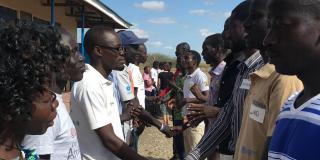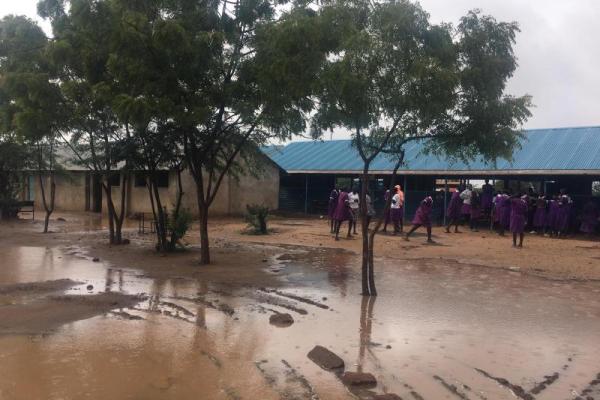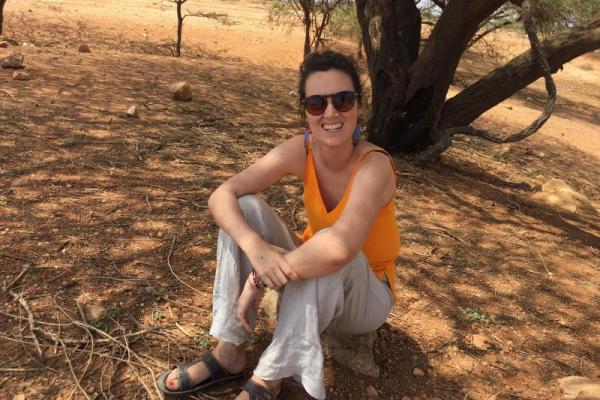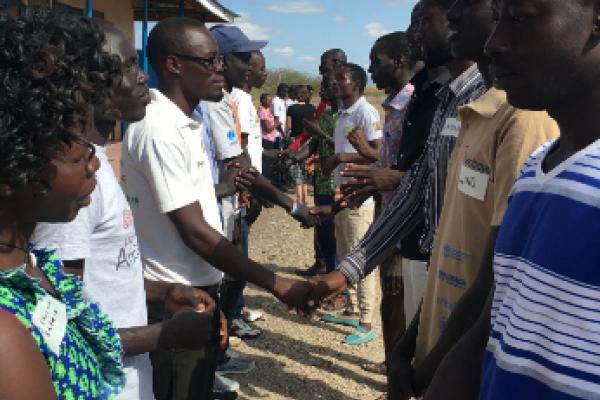
Education volunteer Casey Pearson is helping refugee families find order amid the chaos of Kakuma refugee camp in Kenya.
Imagine that today is the first day in your career as a teacher. You’re excited and feel ready to make a difference.
The only problem is you’ve had zero training, you have a class of one hundred students to teach and the majority of them don’t speak the same language as you.
It’s noisy, and no one’s paying attention. You can see there are children here that are keen to learn, but as the lesson progresses, they become frustrated and start to switch off.
By the time school finishes, you are ready to give up.
This may sound like a bad dream, but for 800 refugee teachers in Kakuma refugee camp, this is an everyday reality.
The origins of Kakuma
While the refugee crisis has only made headlines in recent years, Kakuma refugee camp, in northwestern Kenya, was established 25 years ago.
It was originally created for the ‘Lost Boys of Sudan’ – a group of 20,000 boys of the Nuer and Dinka ethnic groups, who were displaced or orphaned during the Second Sudanese Civil War.
Now the camp is home to more than 190,000 refugees, bringing the camp severely over-capacity.

VSO education volunteer, Casey Pearson, describes Kakuma as ‘a protracted crisis’.
The refugees that call Kakuma home hail from Sudan as well as neighbouring countries, such as Somalia, Eritrea, Ethiopia and Uganda.
Even though Kakuma was established years ago, many homes are fragile structures made of mud, wood and corrugated iron. In this overcrowded setting, water sanitation is a common issue, and the camp is prone to flooding.
At crisis point
Casey Pearson, who is undertaking a year-long placement supporting the training of refugee teachers, has seen the numerous challenges they face.
“When children arrive at the camp, they may be unaccompanied, vulnerable and in need of support.
“Some children will have missed years of schooling because they were child soldiers or may have dropped out of school due to disruption.”
Language is also a barrier – there is a range of language ability, with many speaking different languages.
Besides this, teachers are faced with class sizes of around 90-100 students at primary level, and 150-200 students for pre-primary education.
“The class sizes are so shocking!” says Casey. “Working in a refugee setting is such a challenge on every level: funding, capacity, resourcing, motivation, energy.”

The impact of a volunteer
In this environment, training and support of teachers is crucial. All of the teachers are refugees themselves and may be dealing with their own trauma.
Casey, whose role is organised in partnership between VSO and the Norwegian Refugee Council (NRC), is helping teacher training become more effective.
“When I arrived, training was done in isolation. It was all very random and sporadic and previous trainings hadn’t continued,” said Casey.
Now, Casey has worked with partners to harmonise training across agencies, and created a database of all 800 teachers, detailing what training each has received. This stops training being repeated, and means training reaches those who need it most.
The training is helping teachers manage the large classes, through techniques like sitting taller children at the back of the class so they can all see, and using simple focus strategies where learners copy the teacher's claps to help get everyone's attention and manage noise levels.
Casey has noticed modest improvements in the language ability of these students, and it’s these small wins that keep her motivated.

“I’ve had mini eureka moments during training where a teacher has turned around to me and said they feel like they understand the impact corporal punishment can have on learners and that they feel more confident to try alternative strategies.
Baby steps
Without English language skills, students are unable to understand the other lessons being taught. All lessons are taught in English, the official language of instruction in Kenya.
In response, Casey has developed a pilot language bridging scheme, through the NRC’s accelerated education programme, which will help fast track learners’ English skills and includes 60 minutes per day of extra language practice.
“It’s so hard to change mindsets. In such a harsh environment it’s about baby steps.”
In the chaos of Kakuma, the process of going to school can be comforting for children.
“It provides a lot of support for mental wellbeing,” says Casey. “In a situation where home comforts and normality is turned upside down, going to school provides structure and support.
“It lets parents be free from their children for the day so they can try to cope, and get their food rations or do what they need to do.”
The migrant crisis
“The reality is the global migrant crisis isn’t going away,” says Casey. “Refugee and migrant crises are such a huge issue that won’t be solved without global support.”
“It’s a situation that is completely beyond those who are affected’s control. Some of the refugees here were members of government, or headteachers and many are children.”
“With the wealth of the UK, we have a moral responsibility to help out. It’s the right thing to do.”
Refugee and migrant crises are such a huge issue that won’t be solved without global support.
Casey has seen first-hand the impact of UK Aid:
“For the teachers, to be a refugee with no training and no qualifications, and then being expected to teach one hundred kids, is really tough.
“For people to take note of these teachers, supporting them so that they feel their own worth and value, is really important for developing their own resilience and wellbeing.”
Ultimately, it all comes down to improving standards of education for children based in these fragile environments.
“When school quality is poor it can be such a barrier. I think education is the key to an alternate future for a lot of children.”
Read more
Creating smiles in a Rohingya refugee camp
One year ago, VSO supporters donated £130,000 to help Rohingya children living in Cox’s Bazar, Bangladesh. One year on, we look at the tremendous impact the project has made for thousands of people.
5 things I've learned volunteering in a refugee camp
Kenyan volunteer Ann Wambui shares what she's learnt as a volunteer in Cox's Bazar camp in Bangladesh.
